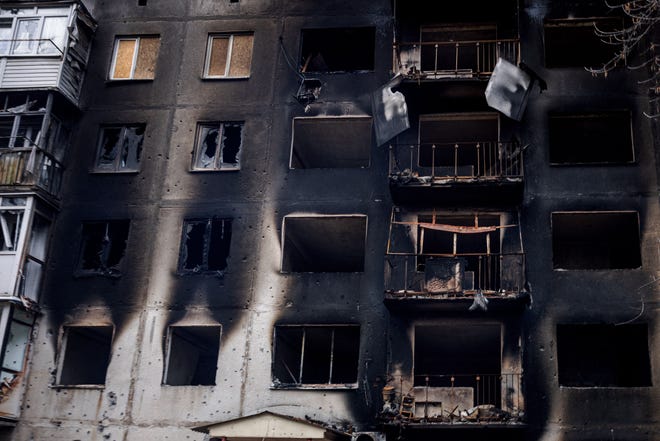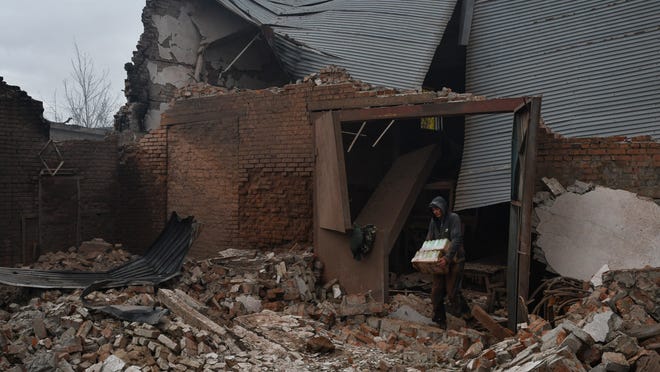Iran is reportedly preparing to send about 1,000 additional weapons, including short-range ballistic missiles and more attack drones, to Russia to use in its war against Ukraine.
CNN first reported the deal, citing officials from a Western country that closely monitors Iran’s weapons program. Ukrainian Air Force spokesman Yurii Ihnat told Ukrainian media that the Kremlin is buying the Iskander ballistic missiles from Iran because Russia is running out of them.
“It is theoretically possible to shoot them down but very difficult with the means we have at our disposal,” Ihnat said. “We have air defense, not missile defense.”
He said he believes they will be placed on the northern border with Ukraine to fire at targets across Ukraine. Iran already has been supplying Russia with explosive drones. They have caused heavy damage to infrastructure, although the Ukrainian military says it is seeing increasing success in shooting them down.
“Transferring missiles to RF, Iran knows that it will attack our cities. Teaching Russians to use drones, it knows that they will attack energy sector,” Ukraine presidential adviser Mykhailo Podolyak tweeted. “Tehran is an accomplice of aggression in Europe and must be officially recognized as such.”
Other developments:
►A Moscow court stripped citizenship from antiwar activist Arshak Makichyan, his father and two brothers.
►The National Constitution Center will present its annual Liberty Medal to Ukrainian President Volodymyr Zelenskyy for his “heroic defense of liberty in the face of Russian tyranny.” Zelenskyy said he will give the $100,000 prize to the Ukrainian Veteran Fund.
►Explosions rocked the city of Poltava in northeastern Ukraine early Tuesday, Gov. Dmytro Lunin said on Telegram. Four Russian drones crashed into buildings and ignited fires, three other drones were shot down, Lunin said.
Russia drafting 120,000 more soldiers, says they won’t be sent to war
Russia kicked off its annual fall draft Tuesday with a dubious pledge that the 120,000 would-be conscripts won’t be sent to fight in Ukraine.
Defense Minister Sergei Shoigu said the new servicemen will “perform tasks in accordance with the purpose of military units” but won’t be sent to what the Kremlin calls the “special military operation” in Ukraine.
The Washington-based Institute for the Study of War said in its latest assessment that Russian officials, concerned about draft dodging, are “attempting to deceive the Russian population into believing that autumn conscripts will not be sent to fight.” The assessment says Russia does not consider the regions it has annexed, where some of the most brutal fighting is underway, to be Ukraine.
“Conscripts will almost certainly be deployed to Ukraine after their training is complete around March or April 2023, and could be deployed sooner in response to changes on the battlefield,” the assessment says.
The draft comes days after the end of Russia’s “partial mobilization” draft that added 300,000 military reservists primarily with combat experience. They were told they would undergo training before being sent to the “special military operation” in Ukraine to serve as an occupying force in territories already seized.
The British Defense Ministry, however, reported that thousands of those recruits were sent to the front – many with weapons that “are likely in barely useable condition.” Russian Defense Minister Sergey Shoigu said Tuesday that “drawbacks” seen at the initial stage of that callup had been remedied.
Grain ships sail from Ukraine without Russian protection
Ships loaded with grain are departing Ukraine despite Russia suspending its participation in a U.N.-brokered deal that ensures safe wartime passage of critical food supplies. The U.N. said Tuesday that three ships carrying corn, wheat and sunflower meal left through a humanitarian Black Sea corridor set up in July. A total of 14 ships also sailed Monday. Analysts say Russia still is bound by the terms of the grain deal it signed with Turkey and the U.N., including a commitment not to target civilian vessels carrying the grain that is desperately needed in Africa and elsewhere.
International probe of ‘dirty bomb’ claim nears completion
International experts have almost completed an investigation into unsubstantiated Russian claims that Ukraine is building a radioactive “dirty bomb” at two sites amid rising safety concerns at a war-battered nuclear power plant, the global nuclear energy chief said Tuesday.
Russia’s state-run media outlet RIA Novosti said it had identified the Eastern Mineral Enrichment Plant in central Dnipropetrovsk region and the Institute for Nuclear Research in Kyiv as the locations where the bomb was being developed. Ukrainian authorities deny the claim and asked the International Atomic Energy Agency to investigate.
Rafael Mariano Grossi, the agency’s general director, said he would provide his initial conclusions about the latest claims by week’s end.
But Grossi also reiterated concerns over the safety of the Zaporizhzhia Nuclear Power Plant, Europe’s largest, which has been occupied by Russian forces for months. Grossi expressed grave concern about the increasingly stressful working conditions for the plant’s Ukrainian operating personnel, now requested by Russia to sign new employment contracts to replace contracts with the Ukrainian national operator, Energoatom.
Power, water restored in Kyiv after Russian assault on infrastructure
Water and electricity have been fully restored in Kyiv, one day after an onslaught of Russian missiles targeted crucial infrastructure and paralyzed the city of 3 million people, Mayor Vitali Klitschko said. Kyiv will continue to implement rolling blackouts to stabilize the power system’s operation, he said. Monday’s attack during the morning rush hour sent commuters scrambling for cover, knocked out water to 80% of the city and cut power to hundreds of thousands of homes and businesses.
“I ask Kyiv residents to save electricity, especially during peak morning and evening hours,” Klitschko said on Telegram. “It is very important because the (damage) in the energy system of Ukraine is significant.”
Contributing: The Associated Press






